On August 8, 2024, two bills, the Waqf (Amendment) Bill, 2024, and the Mussalman Wakf (Repeal) Bill, 2024, were introduced in the Lok Sabha with an aim to streamline the Waqf Board’s work and ensure the efficient management of Waqf properties.
The objective of the Waqf (Amendment) Bill, 2024, is to amend the Waqf Act, 1995, to redress the issues and challenges in regulating and managing Waqf properties. The Amendment Bill seeks to improve the administration and management of waqf properties in India. It aims to overcome the shortcomings of the previous act and enhance the efficiency of Waqf boards by introducing changes such as renaming the Act, updating the definitions of waqf, improving the registration process, and increasing the role of technology in managing waqf records.
The primary objective of the Mussalman Wakf (Repeal) Bill, 2024 is to repeal the Mussalman Wakf Act, 1923, a colonial-era legislation that has become outdated and inadequate for managing waqf properties in modern India. The repeal aims to ensure uniformity, transparency, and accountability in the administration and management of waqf properties under the Waqf Act, 1995, thus eliminating inconsistencies and ambiguities caused by the continued existence of this redundant law
The Waqf (Amendment) Bill, 2024 has been referred to the Joint Committee of Parliament.
The following FAQs provide an understanding of Waqf’s history, laws, regulations and management.
Q.1 What is the meaning of ‘Waqf’?
Waqf refers to properties dedicated exclusively for religious or charitable purposes under Islamic law, and any other use or sale of the property is prohibited. Waqf means that the ownership of the property is now taken away from the person making Waqf and transferred and detained by Allah. ‘Waqif’ is a person who creates a waqf for the beneficiary. As Waqf properties are bestowed upon Allah, in the absence of a physically tangible entity, a ‘mutawalli’ is appointed by the waqif, or by a competent authority, to manage or administer a Waqf. Once designated as waqf, the ownership is transferred from the person making the waqf (waqif) to Allah, making it irrevocable.
Q.2 What is origin of the concept of ‘Waqf’?
In India, the history of Waqf can be traced back to the early days of the Delhi Sultanate when Sultan Muizuddin Sam Ghaor dedicated two villages in favour of the Jama Masjid of Multan and handed its administration to Shaikhul Islam. As the Delhi Sultanate and later Islamic dynasties flourished in India, the number of Waqf properties kept increasing in India.
There was a case made for the abolition of Waqfs in India in the late 19th Century when a dispute over a Waqf property ended up in the Privy Council of London during the days of the British Raj. The four British judges who heard the case described the Waqf as “a perpetuity of the worst and the most pernicious kind” and declared Waqf to be invalid. However, the decision by the four judges was not accepted in India, and the Mussalman Waqf Validating Act of 1913 saved the institution of Waqf in India. Since then, no attempt has been made to curb Waqfs.
Q.3 What are the key legislative changes and developments in the administration of Waqf properties in India through Waqf Act?
The Waqf Act, 1954 – Waqf has only been strengthened post-independence. The Waqf Act of 1954 passed provided a pathway toward the centralisation of Waqfs. Central Waqf Council of India, a statutory body was established in 1964 by the Government of India under this Waqf Act of 1954. This central body oversees the work under various state Waqf boards which were established under provisions of Section 9(1) of the Waqf Act, 1954.
The Waqf Act, 1995 – The Waqf Act was made even more favourable to Muslims in 1995, which made it an overriding law. The Waqf Act, 1995 was enacted to govern the administration of Waqf Properties (Religious Endowments) in India. It provides for the power and functions of the Waqf Council, the State Waqf Boards, and the Chief Executive Officer, and also the duties of mutawalli. This Act also describes the power and restrictions of a Waqf Tribunal that acts in lieu of a civil court under its jurisdiction. The Waqf Tribunals are deemed to be a civil court and required to exercise all the powers and functions exercised by a civil court under the Code of Civil Procedure, 1908. The decision of a Tribunal shall be final and binding on the parties. No suit or legal proceedings shall lie under any civil court. Thus, making the Waqf Tribunal decisions above any civil court.
Amendments in 2013 – Some provisions of the Act were amended in the year 2013 to make waqf management more efficient and transparent. However, during the course of implementation of the Act, it was felt that the Act did not prove effective in improving administration of Waqf.
The Waqf Repeal Bill, 2022 – For the purpose of achieving a more equitable arrangement and treatment of bodies such as waqf and other recognized religious entities established under similar intent, the aforesaid Waqf Act, 1995 as amended was tabled in Rajya Sabha on December 8, 2023.
Q.4 Are the Waqf properties revocable?
No, since the ownership of the property is transferred to Allah from the waqif in the case of Waqf, and property cannot be taken back from Allah, once a property becomes Waqf, it will always stay Waqf, making it irrevocable. Once a property is declared waqf, it remains so forever. Examples include the Bengaluru Eidgah ground, claimed as waqf property since the 1850s. Similarly, the Surat Municipal Corporation building, claimed due to historical use as sarai during Hajj in the Mughal era.
Q.5 Do all the Islamic Countries have Waqf Properties?
No, not all the Islamic countries have Waqf properties. Islamic Countries such as Turkey, Libya, Egypt, Sudan, Lebanon, Syria, Jordan, Tunisia, and Iraq do not have Waqfs. However, in India, not only are Waqf Boards the largest urban landowners, but they also have an Act protecting them legally.
Q.6 How many properties does the Waqf Board control?
Wakf Boards currently control 8.7 lakh properties spanning 9.4 lakh acres across India with an estimated value of 1.2 lakh crores. India has the largest waqf holding in the World. Further, Waqf Board is the largest landowner in India after the Armed Forces and the Indian Railways.
Q. 7 How many Waqf Estates are registered under Waqf Board?
There are 356, 051 Waqf Estates registered under waqf Board.
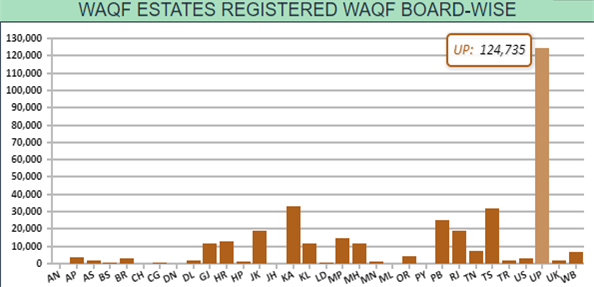
Q.8 How many Immovable Properties are registered under Waqf Board?
There are 872,328 immovable properties registered under Waqf Board.
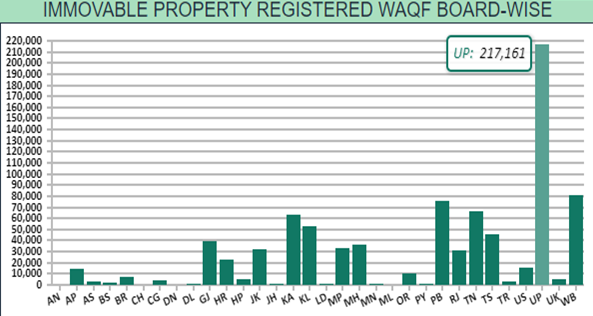
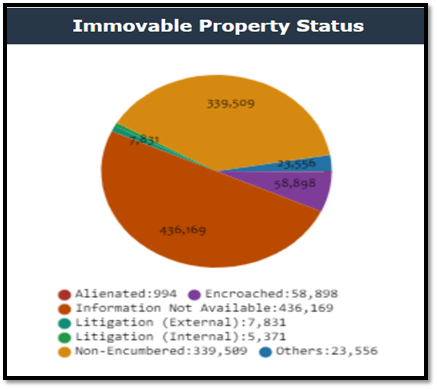
Q.9 How many movable properties are registered under Waqf Board?
There are 16, 713 movable properties registered under Waqf Board.
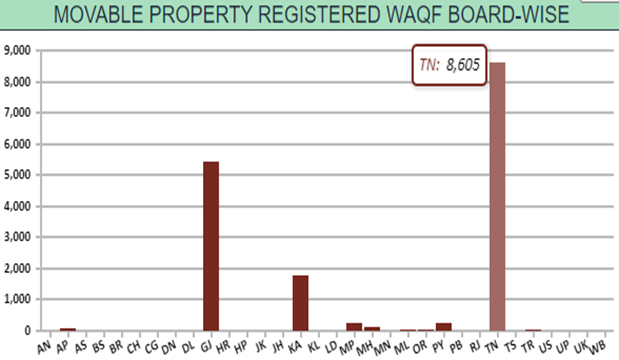
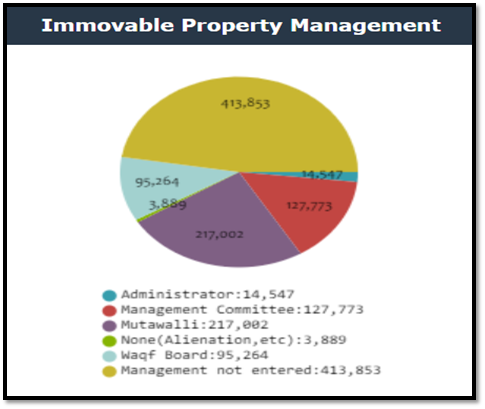
Q.10 How many digitized records do Waqf Board have?
Waqf Board have 330000 digitised records so far.
Q.11 What are the issues concerned with Waqf Board?
The Major issues highlighted by the stakeholders are of limited diversity in constitution of Waqf Board and Central Waqf Council, misuse of power by Mutawallis, non-maintenance of proper accounts of properties by Mutawallis, lack of effective coordination with local revenue authorities, issues of removal of encroachments, registration and declaration of title of WAQF properties, sweeping power to Waqf Boards for claiming properties resulting in disputes and litigation, non-applicability of Limitation Act resulting in creating disharmony among the communities, Low and negligible income from Waqf properties etc. The issues concerned with Waqf Board are as follows:
Irrevocability of Waqf Properties: The principle of “once a waqf, always a waqf” has led to various disputes and claims. Some of which, like the claim on two islands in Bet Dwarka, have been deemed perplexing by courts.
Litigation and Mismanagement: The Waqf Act, 1995, and its 2013 amendment have been criticized for inefficacy, leading to issues like encroachment, mismanagement, ownership disputes, and delays in registration and surveys. A number of issues have also been communicated to the Ministry regarding problem of ownership title and possession of Waqf Properties; complaints and grievances of registration, functioning of Tribunal and related large scale litigations etc.
No Judicial Oversight: There is no judicial oversight on tribunal decisions, further complicating waqf management. Without the possibility of appealing to a higher judicial body, decisions made by the tribunal may undermine transparency, and accountability in the management of waqf properties.
Unsatisfactory Survey Work: The work of survey of Waqf Properties by the Survey Commissioner was found unsatisfactory. Even survey of Waqf Properties is still to be started in the State of Gujarat and Uttrakhand. In Uttar Pradesh, the survey was ordered in 2014 and it is yet to be started. The major issue of non-completing survey is non expertise of Survey Commissioner’s in survey work. Further, there are issues of coordinating survey reports with the Revenue Department to carry out work of registration of Waqf Properties smoothly.
Mis-use of Provisions: It was observed that the State Waqf Boards have also mis-used some of the provisions of the Act which created disharmony and discontent among the communities. Section 40 of the Waqf Act was widely misused to acquire and declare a property as waqf property. This has not only generated enormous number of litigations but also disharmony among the Communities.
Constitutional Validity: Waqf Act is a special Act for religious properties of only one religion of the country, when no such law exists for any other religion. In fact, a PIL has been currently filed in the Delhi High Court asking this very question. Delhi HC has issued notice to the central government on this plea regarding the constitutional validity of Waqf.
Q.12 How many complaints related to Waqf have been received by the Ministry ?
The Ministry has received large number of grievances and representations from the Muslims and non-Muslims on issues like wilful encroachment of waqf land and mis-management of Waqf Properties. The Ministry has analyzed the nature and quantum of grievances received and found that 148 complaints received from April, 2023 are pertaining mostly to encroachments, illegal sales of waqf land, delays in Surveys and registration and complaints against Waqf Boards and Mutawallis. The Ministry has also analysed the complaint received on CPGRAMS (Centralized Public Grievance Redress and Monitoring System) from April, 2022 to March, 2023 and found that out of 566 complaints, received 194 complaints related to encroachment and transfer of waqf land illegally and 93 complaints were against the Officials of Waqf Board/ Mutawallis.
Besides that, the Parliamentarians across the party line raised the issues of delay in registration of Waqf Properties, fetching less rent than the market value by the Waqf Board , rampant encroachment on waqf land, inheritance rights of the widows, non-completion of survey by the Survey Commissioner; slow progress of digitization of Waqf Property records etc.
Q.13 How many cases are pending with the Waqf Administration?
The Ministry has analysed functioning of Tribunals and found that there are 40,951 cases lying pending in Tribunals out of which 9942 cases filed by the Muslims community against the Institutions managing waqf. Moreover, there is inordinate delay in disposal of cases and no provision for judicial oversight provided on tribunal decisions.
Q.14 What are the types of issues/complaints prevalent in existing system?
The hardship caused to common people due to the opacity and overarching power of the Waqf Board can be seen from the following cases:
Thiruchenthurai Village, Tamil Nadu: The farmer Rajagopal from Tamil Nadu, was unable to sell his agricultural land to repay a loan because the Waqf Board claimed his entire village, Thiruchenthurai, as its property. This requirement for a no objection certificate (NOC) caused financial and emotional distress. The village was historically donated as waqf by Nawab Anwardeen Khan in 1956. To prevent illegal sales or encroachments, the Waqf Board requested the registration department to assign a ‘zero value’ to Waqf properties, a request currently stayed by the Ministry of Minority Affairs (MoMA) to allow property transactions. The situation has also spurred political and communal tensions.
Bengaluru Eidgah Ground Case: In the case of Bengaluru Eidgah ground, even though there was no title transfer to any Muslim organisation as per the government, Waqf’s claims that it was a Waqf property from the 1850s means that it is now forever a Waqf property.
Surat Municipal Corporation Case: Recently, the Gujarat Waqf Board had staked claim to the Surat Municipal Corporation building which is now the property of the Waqf because the documents were not updated. As per Waqf, back during the Mughal era, the Surat Municipal Corporation building was a sarai and used during the Hajj travels. The property then belonged to British Empire during British rule. However, when India got independence in 1947, the properties were then shifted to the government of India. However, since the documents were not updated, the SMC building then became Waqf property, and as Waqf Board says, once a Waqf, always a Waqf.
Islands in Bet Dwarka: Divya Bhaskar had reported that the Waqf Board had written an application to Gujarat High Court staking claim on the ownership of two islands in Bet Dwarka in Devbhoomi Dwarka. A perplexed High Court Judge refused to hear the application and asked the Board to revise its petition wondering how can Waqf stake a claim on land in Krishnanagri.
Shiv Shakti Society, Surat: In Shiv Shakti society in Surat where one of the plot owners registered his plot with the Gujarat Waqf Board, making it a holy place for Muslims, and people started offering Namaz there. This implied that an apartment in any housing society can any day turn into a mosque without any input from the other members of the society if the owner of that apartment decides to endow it as Waqf.
Q.15 What were the steps taken by the Ministry before introduction of amendment bills?
The Ministry has initiated the process of review of provisions of Waqf Act, 1995 and had consultations with Stakeholders. Two meetings were conducted last year, one in Lucknow on 24.07.23 and another at New Delhi on 20.07.23 wherein most of the following issues were discussed, wherein consensus had emerged to make suitable amendment in the Act to solve the problems of the affected Stakeholders.
- Widening The Base of Cwc and Swbs Composition
- Role And Responsibilities of Mutawallis
- Re-Structuring of Tribunals
- Improve The Process of Registration
- Declaration Of Titles
- Survey Of Waqf Properties
- Mutation Of Waqf Properties
- Filing Of Accounts by Mutawallis
- Reforms In Filing Annual Accounts
- Review Of Provisions Related to Evacuee Properties/ Limitation Act
- Scientific Management of Waqf Properties
Further, the Ministry has also analysed the international practices on waqf management going in countries such as Kingdom of Saudi Arabia, Egypt, Kuwait, Oman, Pakistan, Bangladesh and Turkey and found that the Waqf Properties are generally regulated by the Laws and Institutions set up by the Government.
Q.16 Which stakeholders have been consulted by the Ministry?
The Ministry of Minority Affairs consulted various stakeholders which interalia includes; report of the Sachar Committee, observations of Joint Parliamentary Committees (JPCs), concern raised by public representatives, Media and general public regarding mismanagement, misuse of powers of Waqf act and underutilization of Waqf Properties by the Waqf institutions. The Ministry also had consultation with State Waqf Boards.
Q.17 What are the recommendations by the Sachar Committee?
The Sachar Committee observed that if these properties are put up to efficient and marketable use , they can generate at least a minimum revenue of 10% which is about Rs. 12000 crores per annum. The Sachar Committee submitted its Report in 2006 and recommended various measures to improve the management of Waqf. It emphasized on:
- Need of regulation and functioning of Mutawallis,
- Efficient management of records,
- Inclusion of non-muslim technical expertise in management of Waqf,
- Organizational reforms to strengthen Waqf Boards administratively to Include two women Member in Central Waqf Board(CWC) and each State Waqf Board(SWBs),
- Appointment of Joint Secretary level Officer in CWC/SWBs,
- Bring the Waqf under the Scheme of financial audit .
Q.18 What are the recommendations by the Joint Parliamentary Committee?
The Joint Parliamentary Committee Report on Waqf presented to Rajya Sabha on 4th March, 2008 recommended following:
- Re-vamping of composition of Waqf Boards,
- Providing a Senior Level Officer as CEO for SWBs,
- Stringent action for unauthorized alienation of Waqf Properties,
- Stringent punishment to Mutawallis; if he fails to comply with his duties.
- It has also recommended taking certain matters to the Hon’ble High Court under Writ jurisdiction.
- Computerization of Waqf Boards and adequate representation to the Shia community in the CWC.
Q.19 What are the key features of the Waqf (Amendment) Bill, 2024?
The key features of the Waqf (Amendment) Bill, 2024 are:
1. Renaming the Waqf Act, 1995: The Act has been renamed to the Unified Waqf Management, Empowerment, Efficiency, and Development Act, 1995, to reflect its broader objective of improving the management and efficiency of Waqf boards and properties, emphasising empowerment and development along with effective administration.
2. Formation of Waqf: The Act allows waqf to be formed by: (i) declaration, (ii) recognition based on long-term use (waqf by user), or (iii) endowment when the line of succession ends (waqf-alal-aulad).
- The Bill states that only a person practicing Islam for at least five years may declare a waqf. It clarifies that the person must own the property being declared.
- It removes waqf by user, where properties could be deemed as waqf based solely on prolonged use for religious purposes.
- It also adds that waqf-alal-aulad must not result in denial of inheritance rights to the donor’s heir including women heirs.
3. Government property as Waqf: The Bill states that any government property identified as waqf will cease to be so. The Collector of the area will determine ownership in case of uncertainty, and submit a report to the state government. If deemed a government property, he will update the revenue records.
4. Power to determine if a property is waqf: The Act empowers the Waqf Board to inquire and determine if a property is waqf. The Bill removes this provision.
5. Survey of waqf: The Act provides for appointment of a Survey Commissioner and additional commissioners to survey waqf. The Bill instead empowers Collectors to do the survey. Pending surveys will be conducted as per the state revenue laws.
6. Central Waqf Council: The Act constitutes the Central Waqf Council to advise the central and state governments and Waqf Boards. The Union Minister in-charge of Waqf is the ex-officio chairperson of the Council. The Act requires that all Council members be Muslims, and at least two must be women. The Bill instead provides that two members must be non-Muslims. MPs, former judges, and eminent persons appointed to the Council as per the Act need not be Muslims.
The following members must be Muslims:
- representatives of Muslim organisations,
- scholars in Islamic law, and
- chairpersons of Waqf Boards.
Of the Muslim members, two must be women.
- Waqf Boards: The Act provides for election of up to two members each from electoral colleges of Muslim: (i) MPs, (ii) MLAs and MLCs, and (iii) Bar Council members, from the state to the Board. The Bill instead empowers the state government to nominate one person from each of the above background to the Board. They need not be Muslims. It adds that the Board must have: (i) two non-Muslim members. and (ii) at least one member each from Shias, Sunnis, and Backward classes of Muslims. It must also have one member each from Bohra and Agakhani communities if they have waqf in the state. The Act provides that at least two members must be women. The Bill states that two Muslim members must be women.
- Composition of Tribunals: The Act requires states to constitute Tribunals to address disputes over waqf. The Chairman of these Tribunals must be a Judge of the rank equivalent to a Class-1, District, Sessions, or Civil Judge. Other members include: (i) a state officer equal to an Additional District Magistrate, and (ii) a person knowledgeable in Muslim law and jurisprudence. The Bill removes the latter from the Tribunal. It instead provides the following as members: (i) a current or former District Court judge as its chairman, and (ii) a current or former officer of the rank joint secretary to the state government.
- Appeal on orders of Tribunals: Under the Act, decisions of the Tribunal are final and appeals against its decisions in Courts are prohibited. The High Court can consider matters on its own accord, on an application by the Board, or an aggrieved party. The Bill omits provisions deeming finality to Tribunal’s decisions. Tribunal’s orders may be appealed in the High Court within 90 days.
- Powers of the Central Government: The Bill empowers the central government to make rules regarding: (i) registration, (ii) publication of accounts of waqf, and (iii) publication of proceedings of waqf Boards. Under the Act, state government may get the accounts of waqfs audited at any point. The Bill empowers the central government to get these audited by the CAG or a designated officer.
- Waqf Boards for Bohra and Agakhani: The Act allows establishing separate Waqf Boards for Sunni and Shia sects if Shia waqf constitute more than 15% of all waqf properties or waqf income in the state. The Bill also allows separate waqf boards for Aghakhani and Bohra sects.
 Matribhumi Samachar English
Matribhumi Samachar English


